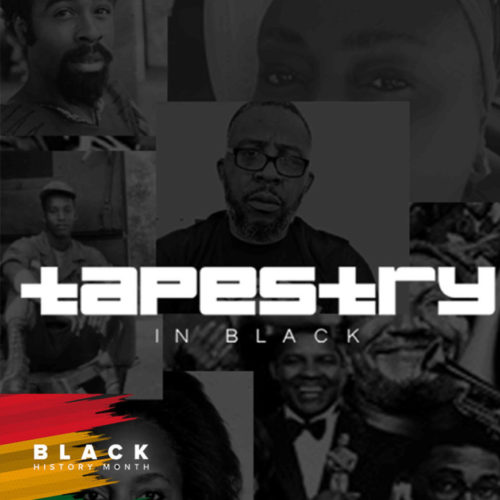
By Sherri Kolade,
Digital content creator Khaliph Young knows a thing or two about developing social media strategies and leveraging smart TVs and mobile apps to promote lifestyle brands as he does it for a living at his company Zen Zen Mobile.
Young is knee-deep in producing video and podcast content, visual brand storytelling, social media and content strategies.
It was a no-brainer then for Young to marry his love of content with his appreciation for Black history and culture as a Black brother in Detroit.
He recently debuted his latest brainchild, a podcast, “Tapestry in Black,” during Black History Month to showcase the creative local forces of arts, music, racial reckoning, and more on his show.
“Black stories are the fabric and tapestry of America and make up an endless cornucopia of soulful and life-changing experiences,” according to the show’s description. “The stories are different but the Blackness is the same. The ‘Tapestry in Black’ podcast series shares stories of the Black people that lived them.”
It just became a situation where preserving our oral histories and sharing our oral histories, you know, much like the griots [African storytellers].
KHALIPH YOUNG
The show, broken up into seasons, features local Black people doing unique things in and around the city. Their passion for developing it and what they plan to share is all on the line as Young centers the show around their lives, upbringing, influences and more, intertwined with upbeat instrumental music and background sounds to keep the listener engaged.
Young told the Michigan Chronicle that the podcast was birthed out of several creative ventures he went on including a previous show he had, “Soulitude,” which explored the human experience at the onset of COVID.
“I was listening to those stories. And I was like, ‘Oh, man, you know, this would be really good to follow up with that,’” he said of the podcast. “And then once that episode was done, it was like, you know, let’s follow up with some other interesting stories. And so, I started with my mom and some other people I knew that had some interesting stories, and then some I didn’t know they had interesting stories until they told me and so it just became a situation where preserving our oral histories and sharing our oral histories, you know, much like the griots [African storytellers].”
With season one already a wrap, Young plans to roll out season two down the line once more interviews are secured.
According to podcasting host, Buzzsprout, podcasts have increased in numbers since their inception in the early 2000s.
With the introduction of smartphones, smart speakers (such as Amazon Alexa, Google Home, etc.), mobile devices, and in-dash entertainment systems, the market expanded.
According to statistics, over one-third (104 million) of Americans listen to podcasts regularly.
Podcasting grew dramatically during COVID, and podcast listeners were increasingly diverse.
Young said that similar to the African Sankofa bird (whose feet face forward while its head is turned back with an egg in its mouth) letting people share their stories on his platform stirs up feelings of remembrance from the speakers while empowering the listeners to remember to reach back.
“Knowing where we come from and who we are helps, and I think a lot of youth is at a loss and don’t have that connection. And that’s why … we’re lost in America because we don’t have knowledge of self you know, or family or family history. And so, I just want this to be able to encourage others to, especially the youth, sit with your elders and talk to them and learn from them as the best you can.”
I just want this to be able to encourage others to, especially the youth, sit with your elders and talk to them and learn from them as the best you can.
KHALIPH YOUNG
Young added that in the ‘60s it was a “turbulent time for African Americans in the United States.”
He said that many of his guests have spoken of living during that time, which is seemingly repeating itself with unrest and violence.
“It was just an interesting time that really parallels with our times the last four to six years,” he said.
Video Producer Iman Young, a story producer and editor for the podcast told the Michigan Chronicle that as a third-generation communications professional, it’s an “honor” to work with her father.
“I’ve seen him work on many projects, but this one seems special. The thought of working with family on building our own framework for documenting Black oral narratives is most fulfilling,” she said.
Larry Bragg, 73, who grew up in the ‘60s, appeared on one of the podcast episodes when he described how stepping out of high school into a world of “chaos and change” was an unsettling norm for people, Black people especially, in his day.
“I grew up in the ‘60s east side of Detroit,” he said, adding that growing up he experienced his neighborhood change with the infiltration of drugs, the Vietnam war and other outside influences. The music of Motown also was the soundtrack of his life with its influences and cultural impact. “[It was] all part of it.”
Bragg said that being on the show and retelling his history, a slice of American history is one for all generations to take in and understand so that history doesn’t repeat itself.
“I think it’s important because how do we get to the next level if we don’t know what people went through back in the day? How are they going to move forward?”
The series is on Amazon music, iHeart, iTunes, and podbean.
___
This post was originally published on Michigan Chronicle




